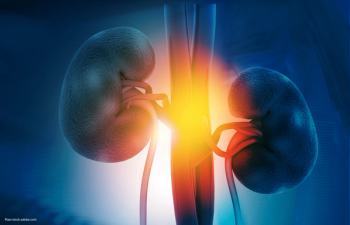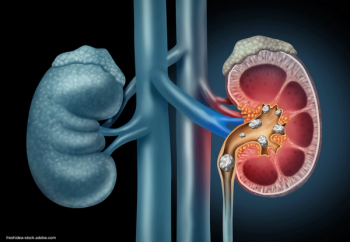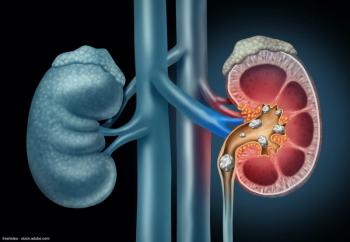
“I think this study gives us actual numbers, so we can have a sense of how much time people will take off over time,” says Samuel L. Washington, MD, MAS.

“I think this study gives us actual numbers, so we can have a sense of how much time people will take off over time,” says Samuel L. Washington, MD, MAS.

“There are always other aspects of care other than that immediate treatment period that's needed,” says Samuel L. Washington III, MD.

"We'll have to obviously amend this document quickly as these drugs move earlier in the stage of disease," says Thomas A. Hope, MD.

UCSF is West Coast leader for the innovative, minimally invasive treatment for prostate cancer patients.

Benjamin N. Breyer, MD, is a urologic surgeon who is internationally known for performing complex urethral and penile reconstruction for urethra stricture and cosmetic disfigurement, male incontinence, male fistula, and surgery for erectile dysfunction.

"In patients with prostate cancer considered for surgery, PSMA-PET can provide information on the risk of recurrence after surgery, before the surgery even happens," says Loïc Djaïleb, MD, PhD.

"Patients and providers should be aware of the long-term risks of radiation exposure when weighing treatment decisions,” says Avi Baskin, MD, MPhil.

“We showed that genetic correction of PSA levels has the potential to both reduce unnecessary biopsies and improve our ability to detect tumors with a more aggressive profile," says Linda Kachuri, PhD, MPH.

Dr. Avi Baskin and Dr. Katsuto Shinohara were honored for their extraordinary work.

“The benefits of FAP-PET imaging include the higher specificity compared to conventional imaging. There's also the potential for upstaging,” said Domenique Escobar, MD.

No CxM-negative patients had findings of a recurrent tumor on a follow-up cystoscopy.

"We think this is an important call to action for the NCCN to follow in the footsteps of the AUA, who recently removed VLR from its prostate cancer guidelines in its most recent update," says Kevin Shee, MD, PhD.

"[Although] American Indian/Alaskan Native patients do present with more advanced prostate cancer, show lower rates of definitive treatment, and higher mortality, once we adjust for some of these disparities in access, we found that there were no significant differences in mortality," says Carissa E. Chu, MD.

In this interview, Ira Sharlip, MD, explains the potential dangers these products pose and what urologists can do to help protect their patients.

“We found many factors in urology that were associated with the inability to follow through with a video visit,” says Kevin Shee, MD, PhD.

"[Low-grade prostate cancer] is a really interesting field right now," says Kevin Shee, MD, PhD.

“As people think about how we can do stone surgery more effectively, less morbidly for our patients, and less invasively, I think we're going to see robots enter our picture,” says Thomas Chi, MD.

“We've got a lot of movement in terms of understanding how stones form, some pharmaceutical interventions that we can use to prevent stones, and then how we can get even less invasive to try to get stones in the least morbid way for our patients,” says Thomas Chi, MD.

Dr. Butler discusses 2022 milestones from her practice in gender-affirming care and looks ahead to what might be on the horizon for the field in the coming year.

Thomas Chi, MD, discusses 2022 milestones in stone disease and looks ahead to what might be on the horizon for the field in the coming year.

"We're trying to figure out how to improve people's relationships with their genitals and like their sexual practices," says Christi Butler, MD.

Dr. Van Kuiken discusses 2022 milestones in FPMRS and looks ahead to what might be on the horizon for the field in the coming year.

“We were able to develop a machine learning model that had decent accuracy…in predicting which patients would have an additional stone event and which patients wouldn't,” says Kevin Shee, MD, PhD.

Join the discussion on Health Reform with world leader in health policy and bioethics, Ezekiel J. Emanuel, MD, PhD, the Vice Provost for Global Initiatives and expert panelists and UCSF leaders.

"HP 13C MRI provides a quick five-minute, non-radioactive, metabolic imaging add-on exam to standard-of-care MRI that, in conjunction with guided biopsies, has great potential to improve the care of prostate cancer patients,” said Robert Bok, MD, PhD.

The phase 3 PRESTO trial had 3 arms: ADT alone; ADT plus apalutamide; and ADT plus apalutamide plus abiraterone/prednisone.

“We wanted to compare outcomes between nursing home residents and community-dwelling older adults undergoing surgery for bladder and bowel dysfunction,” explains Anne M. Suskind, MD.

“It’s hard to see yourself in a field when there are not that many residents or faculty that look like you,” says Micha Cheng, MD, MPH, MS.

Micha Yin-Zheng Cheng, MD, MPH, MS, discusses the background of the UCSF UReTER (UnderRepresented Trainees Entering Residency) Mentorship Program.

Eric J. Small, MD, has been announced as one of the winners of the 10th annual Giants of Cancer Care awards. Small is being recognized for his achievements in the clinical practice and research of genitourinary cancers.